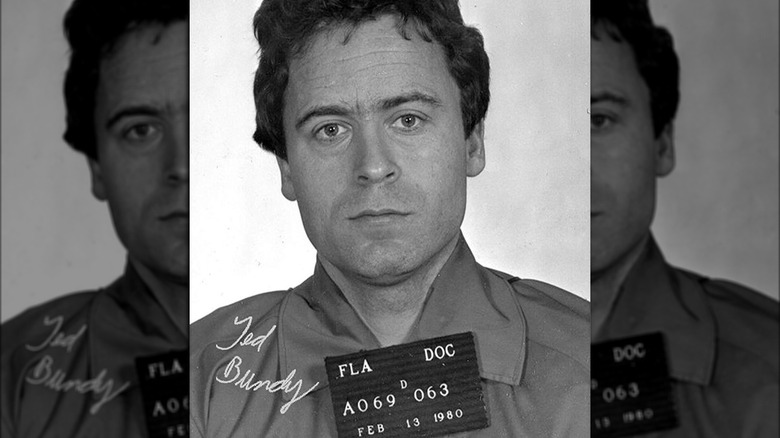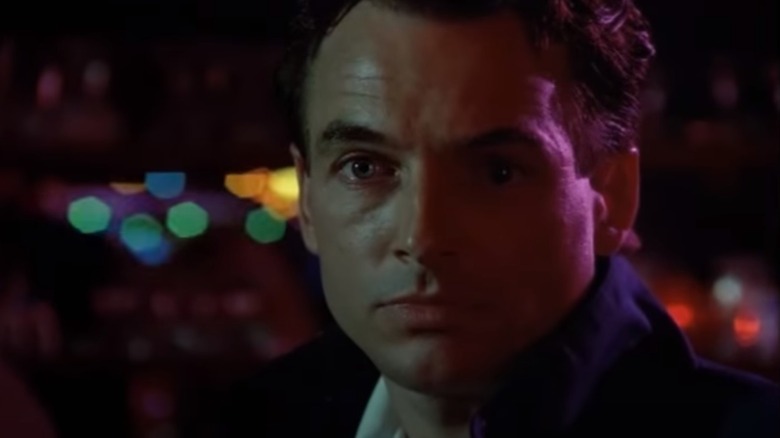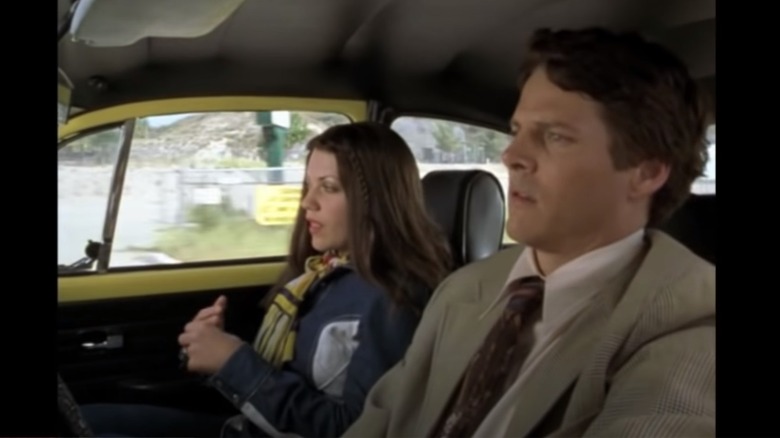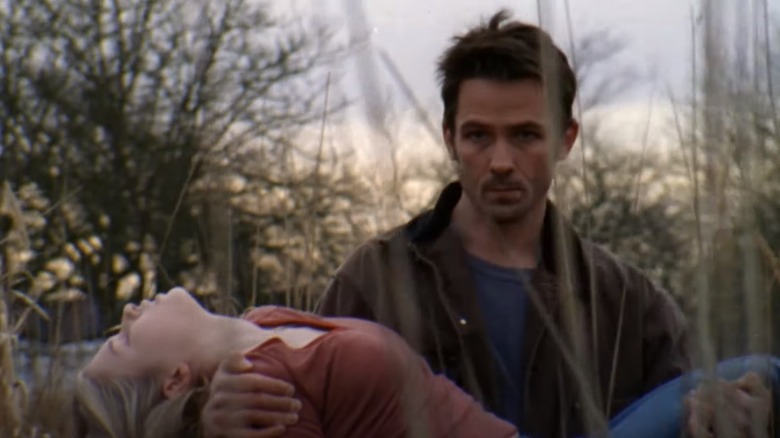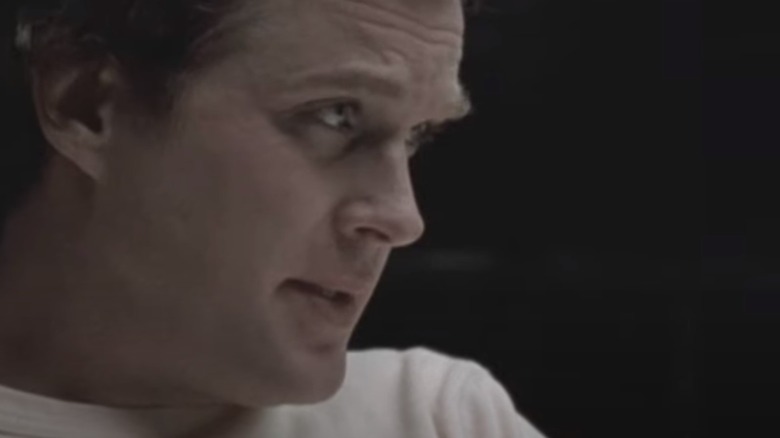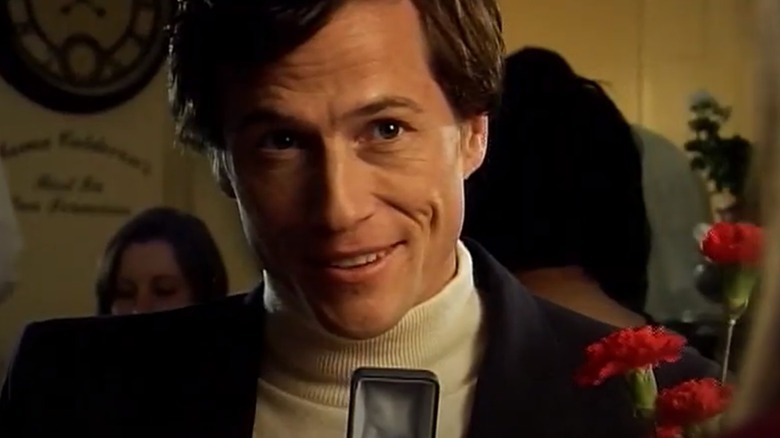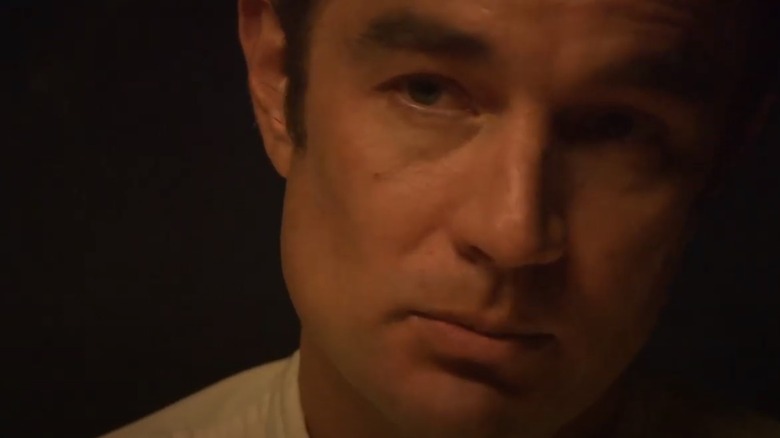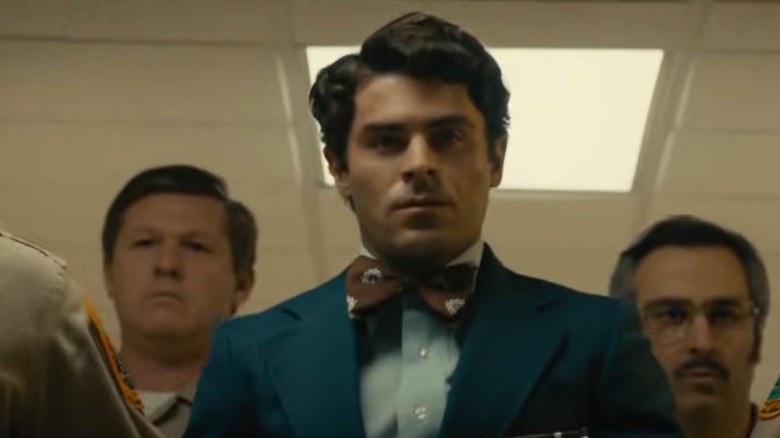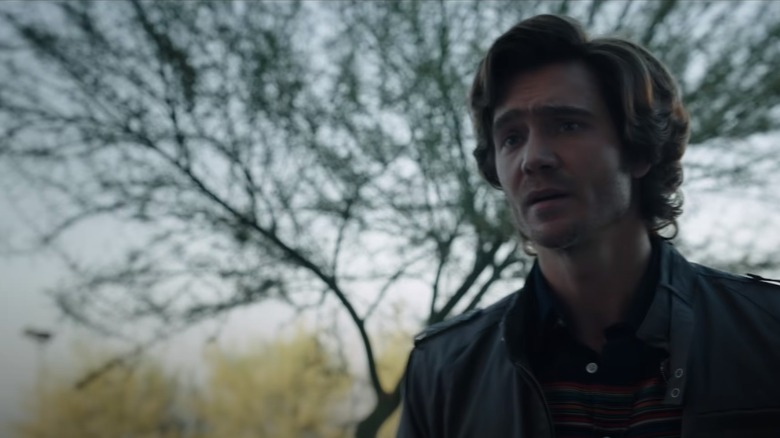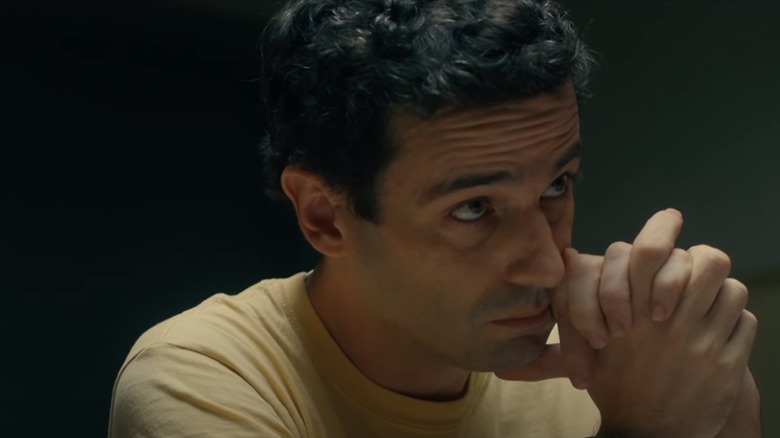Every Actor Who Has Played Ted Bundy In A Movie
When it comes to serial killers, Ted Bundy is something of the crown prince. Why? Who knows! He's not the most prolific, he doesn't hold a record for being active for the longest time, and he wasn't even the one who evaded law enforcement for the longest. But still, he's secured his immortality thanks to a morbid, widespread fascination with him and his crimes.
It's no secret that the general populace is fascinated with serial killers. There aren't just movies and TV shows about them — there are also people who collect their artwork and befriend them in prison after striking up pen-pal relationships. Some, like Richard Ramirez, even marry their biggest fans. But the obsession with Bundy has gone to a whole new level, and his story has been told on the big and small screen so many times that recent announcements of more films and documentaries on the killer have started to get some backlash.
In 2021, two more Bundy movies were announced on the heels of Netflix's 2019 addition to the lore and a few more documentaries. It got people asking where the line was between studying and understanding serial killers versus glamorizing them, and it's a bit of a fuzzy area. With that in mind, let's take a look at every actor who has stepped into the shoes of one of America's most weirdly popular serial killers.
Mark Harmon in The Deliberate Stranger
Ted Bundy was executed on January 24, 1989, after he was sentenced to death not once but twice. And that's important because when the first Ted Bundy movie came out, he was still very much alive. "The Deliberate Stranger" was released in 1986, and it featured a Bundy that might look a little odd to 21st-century audiences. Mark Harmon went on to be more well-known as NCIS boss Leroy Jethro Gibbs, but when he signed on to play Bundy, the Lakeland Ledger noted that he was still very much the "OK-now-whip-off-your-shirt" guy. Still, Rotten Tomatoes has a largely favorable score for this first Bundy movie, and with an audience rating of 72%, that's nothing to sneeze at. The movie definitely leans heavily into the idea that Bundy was guilty, and at the time, he was still proclaiming some innocence.
Harmon said that when he took the role, his first instinct was to sit down with Bundy for a face-to-face chat (via Showbiz CheatSheet). The powers-that-be talked him out of it, though, and he explained: "This is a guy who's never admitted his guilt, so a great percentage of what I could have hoped to meet in Florida ... would have been based around meeting a charming guy who everybody else thought they knew initially." And that wasn't the guy he wanted to play — he wanted to play the killer beneath the public persona, so he passed on meeting him.
Michael Reilly Burke in Ted Bundy
The film starring Michael Reilly Burke as the title character came out in 2002, and it wasn't well-received. In fact, Rotten Tomatoes sums it up like this: "'Ted Bundy' wastes an impressive performance from Michael Reilly Rourke on an exploitative film devoid of any social context or depth." Audiences largely agreed, giving it a 45% that made it clear most walked away going, "Eh." And yes, they may have given the lead actor a shout-out for his acting chops, but absolutely got his name wrong.
The BBC explained further, noting that while there was a lot of gore and graphic violence, the film completely missed the part that's fascinating to so many people — the question of what makes a serial killer and what drives them to do the horrible, violent things that they do. They called the film "an orgy of gratuitous violence," and The Guardian was even less impressed. They described it as "one of the most drearily pointless new films around," and sympathized with Burke for being cast in a role that the movie just didn't know what to do with.
Billy Campbell in The Stranger Beside Me
Audiences didn't think too much more of 2003's "The Stranger Beside Me," which clocked into Rotten Tomatoes with a 41% rating. SFGate does give Campbell props for being a pretty standard Bundy: "Campbell ... uses his delicate features and unruffled demeanor to create a frictionless manipulator." But it's a shame there's not more good things to say about this one, because the story it revolves around is actually fascinating. In the late 1970s, Bundy lived in Seattle for a bit, and as unthinkable as it is, he spent some time volunteering at a suicide crisis call center.
It was there that he met Ann Rule, and the two struck up a friendship. At the time, she was working as a journalist, and yes, she was absolutely investigating the murders that her new friend was secretly committing. According to The Washington Post, it was Rule who tipped police off after realizing that the descriptions of the presumed killer matched the super-nice guy that she was working with. And even after police told her that the car matched as well as the description, they stayed friends. Bundy wasn't investigated, he continued to kill, and later, Rule wrote a book — along with other novels in the crime genre — which became "The Stranger Beside Me."
Cary Elwes in The Riverman
What does the river have to do with Ted Bundy? Nothing, at a glance — but it has everything to do with the Green River Killer. The idea that Ted Bundy had something to do with the capture of Gary Ridgway — otherwise known as the Green River Killer — sounds like something someone made up so they could put Cary Elwes in a movie, but it's absolutely true. Bundy was sitting in jail when he reached out to detective Dave Reichert with an offer to help them build a psychological profile on the killer that was giving them so much trouble, and a lot of what he said was right.
It's a weird bit of history that could make for a great story, but sadly, 2004's "The Riverman" only managed a dismal 26% on Rotten Tomatoes. Elwes hasn't said too much about it, and when the Daily Dragon Online asked him about taking on unusual roles — specifically Bundy — he replied: "One doesn't want to eat the same meal twice if one can help it. I did get offered a lot of swashbuckling roles after 'The Princess Bride,' of course. ... It's nice to get those offers, but I thought, 'I want to mix it up.'"
Corin Nemec in Bundy: An American Icon/Bundy: A Legacy of Evil
In 2021, media outlets like The Guardian and ScreenRant kicked off a discussion about why movies about Ted Bundy just needed to stop. There were a lot of accusations of glorifying his crimes and glamorizing him as the hot serial killer, but how about 2008's addition to the Bundy library? It was called alternately "Bundy: An American Icon" and "Bundy: A Legacy of Evil," and it's tough to argue against accusations of mythologizing a serial killer when the word "icon" is right in the title. But that's what Corin Nemec did, turning to the media in an attempt to convince everyone that his portrayal of Bundy wasn't meant to glorify the killer or killings. He told Deseret News: "We had the utmost respect and sympathy for the families of those who were killed. We wanted to make something that was as accurate and as truthful as possible. That's the best tribute we could do for everyone involved."
Nemec stressed that wasn't just true for his portrayal of Bundy — it was also true of his previous movie "Chicago Massacre: Richard Speck." He played the lead serial killer in this film, too, telling MovieWeb that it was a "down to basics" version of what Speck was and what he'd done.
James Marsters in The Capture of the Green River Killer
When it comes to prolific serial killers, Gary Ridgway was up there at the top. He was convicted of 49 murders, but the chances that the Green River Killer was responsible for many more are pretty good. That was — predictably — the focus of the 2008 Lifetime movie "The Capture of the Green River Killer." Starring Tom Cavanagh as the real-life detective Dave Reichert, it also featured "Buffy the Vampire Slayer's" James Marsters as Ted Bundy. Reichert was the detective who headed south to Florida to interview Bundy after his offer to help build a profile, and Marsters' Bundy ends up being eerily accurate.
Outlets like The Hollywood Reporter weren't overwhelmingly impressed with any part of the movie, but there is an epic footnote to this. According to CNN, one woman who was watching the movie in 2012 realized that there were some of Ridgway's victims who hadn't yet been identified. Given that he was hunting at the same time and place that her cousin went missing, she and her family reached out. After supplying police with DNA samples to compare to the unidentified remains, one was identified as Rochester, New York native Sandra Denise Major. Finally, her family had closure they had been waiting for since her 1982 disappearance.
Zac Efron in Extremely Wicked, Shockingly Evil and Vile
Zac Efron couldn't get much farther away from "High School Musical" than playing Ted Bundy. And according to The Washington Post, the initial trailer for "Extremely Wicked, Shockingly Evil and Vile" kicked off a wave of doubt: Was the film going to show Bundy as some sort of weird idol? They concluded that Efron wasn't precisely a Bundy worth worshipping ... but he wasn't that far off, either.
Efron, it turns out, wasn't entirely sold on the idea of playing Bundy. He revealed on "The Graham Norton Show" (via USA Today): "I had a lot of reservations about playing a killer ... I wasn't interested in glorifying anything, but I was interested in the psychological aspect of whether he was capable of real love."
During an interview with The Guardian, both Efron and director Joe Berlinger made it a point to call out journalist Kira Cochrane when they felt she thought their depiction was too "glamourous" — a word that she never mentioned, but Efron and Berlinger said 11 times during the interview. They explained: Bundy was so normal that he could charm women into taking risks that they normally might not have taken. Efron says: "Ted Bundy himself said that murderers don't come crawling out of the dark." He continued: "I would love, not necessarily just my fans, but anybody who watched the movie, to really invest time in who you trust yourself with, and who you think you're safe with."
Chad Michael Murray in American Boogeyman
It was the trailer for Chad Michael Murray's "American Boogeyman" that prompted The Guardian to ask, "Haven't we been through this before?" Yes, they decided, and then called it another movie with "an attractive Hollywood actor" taking on a monstrous serial killer. They deemed it little better than voyeurism that takes away from the true horror of the Bundy story, but is that a fair assessment?
No, says Murray, who told TV Fanatic that he took that role for the chance "to stand and step in the shoes of someone who is notably one of the most horrific human beings that ever lived." He adds: "It wasn't a love letter to Ted Bundy, which I feel like so many times has played him up to be an antihero, and there's nothing about him that's heroic ... If anything, this was the anti-Ted Bundy film."
Co-star Holland Roden agrees. She told Looper that the film is more about the law enforcement that caught Bundy than the killer himself. Her character, Kathleen McChesney, was a key component of bringing Bundy in, and that's why people should watch. As for Murray, she said: "He played a great Ted Bundy. He had a very particular character choice, and he put a lot of thought into it."
Luke Kirby in No Man of God
The announcement of 2021's other Ted Bundy film, "No Man of God," was the other half of what made The Guardian throw up their hands and proclaim the world's had enough of Ted Bundy. It turns out that Luke Kirby had his doubts, too, and he dragged his feet even after being approached by director Amber Sealey and offered the role. He told MovieMaker: "Everyone has their own taste. This type of material is certainly the kind of thing that has a ... it has beyond an 'ick' factor. It has a repulsion factor to it, and I'm speaking specifically to the character because I know that the story, writ large, is bigger than that. But at the beginning, the sense was one of revulsion."
When Bundy was in prison, he was visited by FBI agent and profiler Bill Hagmaier, and it's that relationship that's explored in this version of the Bundy tale. Hagmaier is played by Elijah Wood, and it looks at just how and why Bundy opened up to speak to this particular interviewer. Kirby credited Sealey with bringing a different side of the Bundy story to the screen, summing it up to ScreenRant like this: "This guy's so messed up that when he has this sort of sincerity, you wonder if it's a facsimile of sincerity, a blueprint of sincerity, or is it true? But I think that's something for people to decide until we know better."
